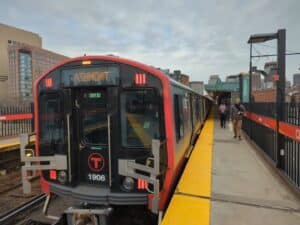
One of the MBTA's new Red Line trains pulls into Charles MGH station in early 2023. Photo by James Sanna | Banker & Tradesman Staff
On April 15, the MBTA will begin offering $7,500 sign-on bonuses for positions throughout the organization, including bus operators, rail repairers, track laborers, streetcar operators, subway train operators, service technicians and fuelers, officials announced Monday.
This bonus will be a big bump up for people looking to join the T, which will expand its previous hiring campaign offering a $4,500 sign-up bonus only to bus drivers. Those existing bonuses are paid out in two installments: $2,500 after training and $2,000 after a year of employment.
The move came the same day a new Massachusetts Taxpayers Foundation analysis said the T needs to hire 2,800 more workers just to meet existing needs at the agency. That’s well above the T’s fiscal 2023 operating budget staffing plan, which called for hiring 1,759 new staff, increasing the MBTA’s operations headcount by a net 1,091 after accounting for backfilling vacancies.
In the first half of fiscal 2023, the T’s 676 total hires nearly doubled the 344 hires the organization made in the same period of fiscal 2022.
When counting how many of the 676 new hires are backfilling vacant positions, the MBTA headcount stood at an increase of about net 170 this fiscal year as of March, the MTF report said.
Along with announcing the hiring bonuses, the T said its hiring team will be in Mattapan, Quincy, Lynn and East Boston in the coming weeks to recruit job candidates. It recently doubled the size of its HR recruiting team and created a new digital “portal” to streamline the hiring process.
MBTA officials are also “brainstorming” with the Executive Office of Labor and Workforce Development to work with job counselors on how to promote job openings in a way that may attract more candidates with the right skills, and have been attending career fairs, they say.
“The MBTA is committed to increasing hiring, supporting our hardworking employees, and ensuring that the T is a desirable place to work,” T spokesperson Joe Pesaturo said in a statement. “A job at the MBTA opens the door to good pay and benefits, as well as long-term career development with plenty of advancement opportunities. We look forward to continued collaboration with elected officials and stakeholders to address our workforce needs and improve safety and reliability across the system.”
Staffing shortages at the MBTA have been linked to safety issues and service disruptions, including derailments, fatalities, runaway trains, cars on fire and, MTF argued, the recent slow zones that cover one-quarter of the subway system. The group said in its report that a stretched-to-thin workforce led to maintenance neglect, and Healey has said she believes “it’s dangerous to have these trains operating… at higher speeds when there are identified safety issues on the track.”
Healey made an early promise to hire an additional 1,000 transit workers before the end of her first year in office, and she recently proposed $20 million toward the effort with other funds for MBTA hiring coming from the money lawmakers and former Gov. Charlie Baker agreed to steer to the T last year.
The money in Healey’s supplemental budget could be earmarked for hiring and retention bonuses, increased pay for bus operators and a marketing campaign, the MBTA says.
As trains run slowly to avoid accidents on possibly uninspected or under-inspected tracks, MTF concluded that worker shortfalls include 785 employees in critical jobs such as rail repairer, bus inspector, track laborer, engineer, fueler, and repairer line 1st class.
There are also approximately 55 fewer transit police halfway through fiscal 2023 than in years 2019 through 2022, even as reports of assaults on train and bus operators increase.
Though recent nationwide labor shortages have exacerbated the problem, the MBTA has been understaffed for several years. The MBTA and FTA each reported that since fiscal 2020, the T has operated with vacancy rates in the excess of 10 percent of the positions they budgeted for, though they were less than 5 percent in fiscal 2019, the MTF report says.
From fiscal 2015 through fiscal 2018, the MBTA intentionally reduced its total number of employees by 10 percent to balance its budget, including initiating an early retirement program in fiscal 2017 that lowered the number of workers by 300 to help close an $80 million budget gap.
A 2019 Safety Review Panel concluded that the move resulted in a “significant brain drain” of talent at the T.




 |
| 

